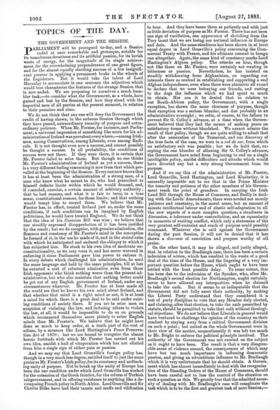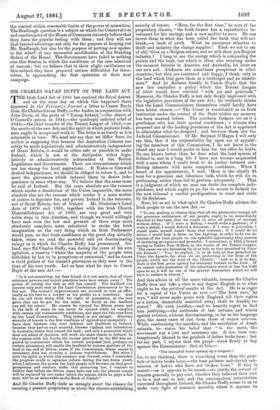TOPICS OF THE DAY.
THE GOVERNMENT AND THE SESSION.
pARLIAMENT will be prorogued to-day, and a Session ended at once remarkable and grotesque, notable for its tumultuous dreariness and its artificial passion, for its lavish waste of energy, for the magnitude of its single achieve- ment, for the overwhelming preponderance of one great figure, and for the almost equally startling success of a few insignifi- cant persons in applying a permanent brake to the wheels of the Legislature. But it would take the talent of Lord Macaulay to accumulate in one sentence the adjectives which would best characterise the features of the strange Session that is now ended. We are proposing to ourselves a much hum- bler task,—to consider what the Government, as a whole, have gained and lost by the Session, and how they stand with the impartial men of all parties at the present moment, in relation to their promises and aims.
We do not think that any one will deny the Government the credit of having shown, in the arduous Session through which they have passed, extraordinary tenacity of purpose and extra- ordinary patience. When Mr. Forster, for instance, met Parlia- ment, a universal impression of something like scorn for his ad- ministration of Ireland was prevalent everywhere,—among Irish- men, among Conservatives, among Liberals, even among Radi- cals. It is not thought even now a success, and cannot possibly be thought a success. In all probability, the conditions of success were not there. If they were there, it is certain that Mr. Forster failed to seize them. But though no one thinks Mr. Forster's administration of Ireland as yet a success, there is a very different feeling concerning it now from that which pre- vailed at the beginning of the Session. Every one now knows that it has at least been the administration of a strong man, of a man who knew what he meant to do, who had prescribed to himself definite limits within which he would demand, and, if conceded, exercise, a certain amount of arbitrary authority ; that he had reasons, and what it is fair to term, in a true sense. constitutional reasons, for those limits; and that nothing would tempt him to exceed them. We believe that Mr. Forster has, in effect, treated Ireland just as, under the same conditions, if such conditions can be imagined by English politicians, he would have treated England. We do not think that the idea of his Coercion Bill was wise ; we believe that our steadily expressed disapprobation of it has been justified by the result ; but we do recognise, with genuine admiration, the firmness and constancy of Mr. Forster's mind in the conception he formed of it, in the use he made of it, and in the stoical calm with which he anticipated and endured the obloquy to which it has subjected him. He stuck to his own idea of moderate un- constitutionality, as we may term it, and has never wavered in enforcing it since Parliament gave him power to enforce it. In every debate which challenged his administration, he used the same language and held by the same principles, till at last he extorted a sort of reluctant admiration even from those Irish opponents who think nothing worse than the present ad- ministration, but who also maintain that nothing better could be got out of any English government of Ireland, under any circumstances whatever. Mr. Forster has at least made all the world see that he knows his own mind about Ireland, and that whether that mind is a right mind or not, it is at least a mind for which there is a great deal to be said under exist- ing conditions of society there. If you are to seize men on suspicion of violating the law, and inducing others to violate the law, at all, it would be impossible to do so on grounds which recommend themselves more plainly to sober English minds than Mr. Forster's. We believe that he might have done as much to keep order, at a tenth part of the cost of odium, by a measure like Lord Hartington's Peace Preserva- tion Act of 1870 ; but we are bound to recognise the almost heroic fortitude with which Mr. Forster has carried out his own idea, amidst a hail of vituperation which has not elicited from him a single sign of either pain or passion.
And we may say that Lord Granville's foreign policy has, though in a very much leas degree, entitled itself to just the same praise as Mr. Forster's Irish policy, for its constancy and unflinch- ing unity of purpose. Not to break up the unity of Europe has been the one condition under which Lord Granville has worked for the extension of the Greek frontier, for the reform of Turkish misgovernment, and in offering resistance to anything like a de- composing French policy in North Africa. Lord Granville and Sir Charles Dilke have had their taunts and scoffs and vilification to bear. And they have borne them as patiently and with just• as little deviation of purpose as Mr. Forster. There has not been one sign of vacillation, one appearance of shrinking from the Tory taunt that we are losing our national influence in Europe and Asia. And the same steadiness has been shown in at least equal degree in Lord Granville's policy concerning the Com- mercial Treaty with France, and his ultimate consent to forego. one altogether. Again, the same kind of constancy marks Lord Hartington's Afghan policy. The attacks on him, though not like those on Mr. Forster, were certainly not wanting in bitterness or passion. Nevertheless, he has insisted on. steadily withdrawing from Afghanistan, on regarding our interests there as centred in establishing and supporting a real Afghan independence, even when there were alarmists all round to declare that we were betraying our friends, and casting to the dogs the influence which we had spent so much to obtain. Nor can it be denied that in relation to our South-African policy, the Government, with a single- exception, has shown the same clearness of purpose, though that exception was a serious blunder, and due probably to an administrative oversight ; we refer, of course, to the failure to prevent Sir G. Colley's advance, at a time when the Govern- ment believed that they had the means of making peace on satisfactory terms without bloodshed. We cannot admire the result of that policy, though we are quite willing to admit that after the annexation of the Transvaal, and our discovery of the true facts of the case, we were in a cut de sac, from which no satisfactory exit was possible ; but we do hold that, ex- cepting the one blunder of allowing Sir G. Colley's advance,. the Government have acted from beginning to end on a single intelligible policy, amidst difficulties and attacks which would have diverted any but a very strong Government from its purpose.
And if we say this of the administration of Mr. Forster, Lord Granville, Lord Hartington, and Lord Kimberley, it is assuredly impossible not to see that in the Prime Minister the tenacity and patience of the other members of his Govern- ment reach the point of grandeur. In carrying the Irish Land Bill through the House of Commons, and finally in deal- ing with the Lords' Amendments, there were needed not merely patience and constancy, in the moral sense, but an amount of minute intellectual labour and of elastic self-adaptation to all the new aspects of a most complex question, a steadiness in discussion, a tolerance under contradiction, and an equanimity in moments of exciting conflict, which only a statesman of the very greatest self-restraint and reach of purpose could possibly command. Whatever else is said against the Government during the past Session, it will not be denied that it has shown a dourness of conviction and purpose worthy of all. praise.
On the other hand, it may be alleged, and justly alleged, that in relation to the Bradlaugh case, there has been a certain. indecision of action, which has resulted in the waste of a good. deal of the time of the House, and the lingering of a very im- portant question before the House, which ought to have been settled with the least possible delay. To some extent, this has been dm to the indecision of the Speaker, who, after Mr.. Bradlaugh's second election for Northampton, ought certainly never to have allowed any interposition when he claimed to take the oath. But it seems to us indisputable that the Government did not fully exert their authority, by making the Liberal Party understand that they considered it a test of party discipline to vote that any Member duly elected, and claiming, after that election, to take the oath prescribed by statute, should be permitted to take that oath without theologi- cal objections. We do not believe that Liberals in general would have ventured to challenge the opinion of the country on their conduct by staying away from a critical Government division on such a point ; but united as the whole Government were in their view of the matter, unquestionably it was left too much to Mr. Bright to enforce the political principle involved. The authority of the Government was not exerted on the subject as it ought to have been. The result is that a very disagree- able scene of violence ensued, the consequences of which may have but too much importance in inflaming democratic passion, and giving an adventitious influence to Mr. Bradlaugh which it is very unfortunate that he should obtain. A Govern ment which has almost immediately to deal with the reorganise tion of the Standing Orders of the House of Commons, should have been careful not to lose the control of the situation on such a question as this. We greatly fear that the admitted neces- sity of dealing with Mr. Bradlaugh's case will complicate the task which is to be the first and greatest task of next Session,— the control within reasonable limits of the power of minorities. The Bradlaugh question is a subject on which the Conservatives and reactionaries of the House of Commons sincerely believe that they have the popular feeling with them ; and they will use that fancied advantage not only for the purpose of keeping out Bradlaugh, but also for the purpose of putting new spokes in the wheel of any successful modification of the Standing Orders of the House. The Government have failed in nothing else this Session in which the conditions of the case admitted of success ; but we believe that in their slight vacillations on this subject they have prepared serious difficulties for them- selves, in approaching the first operation of their next campaign.































 Previous page
Previous page